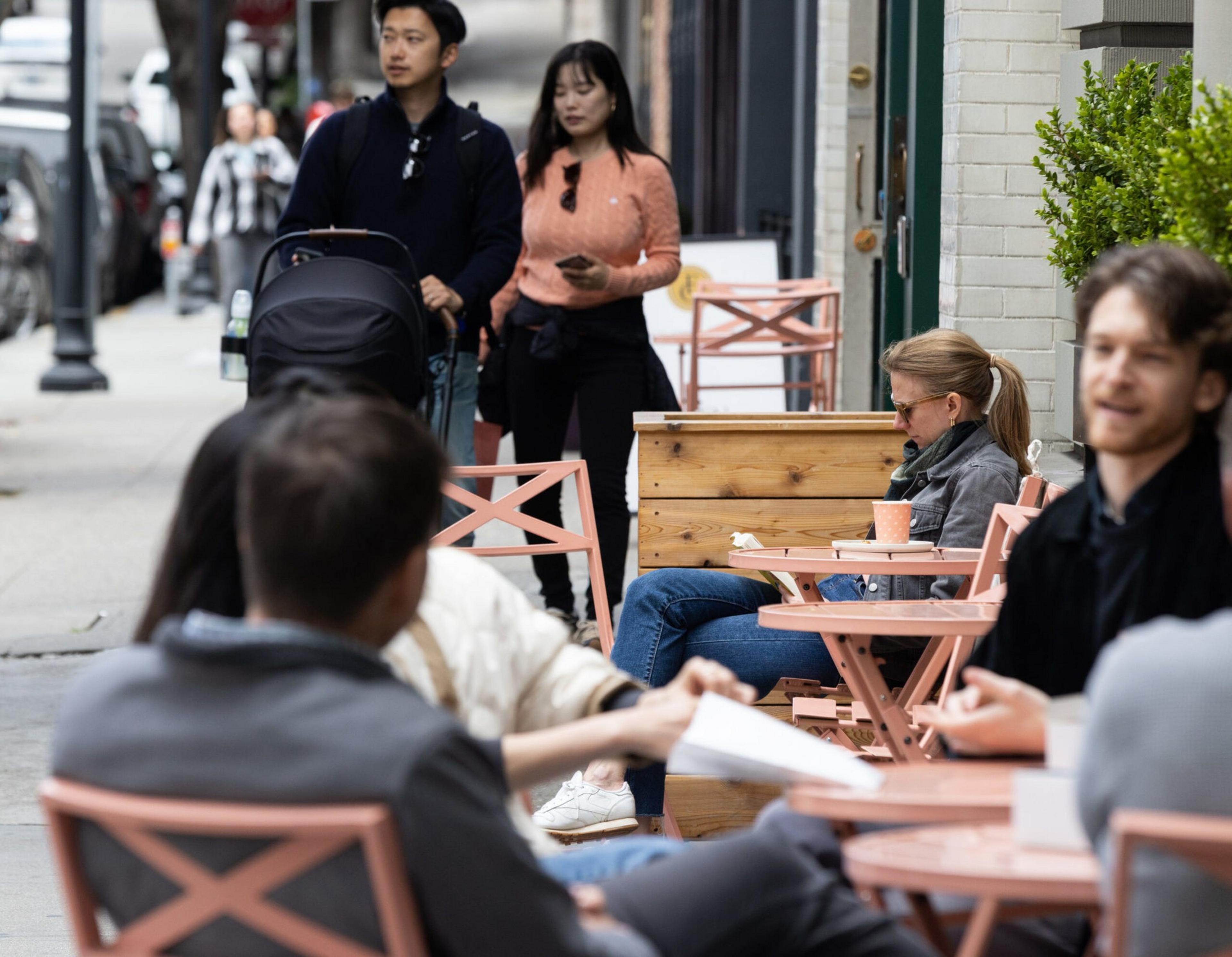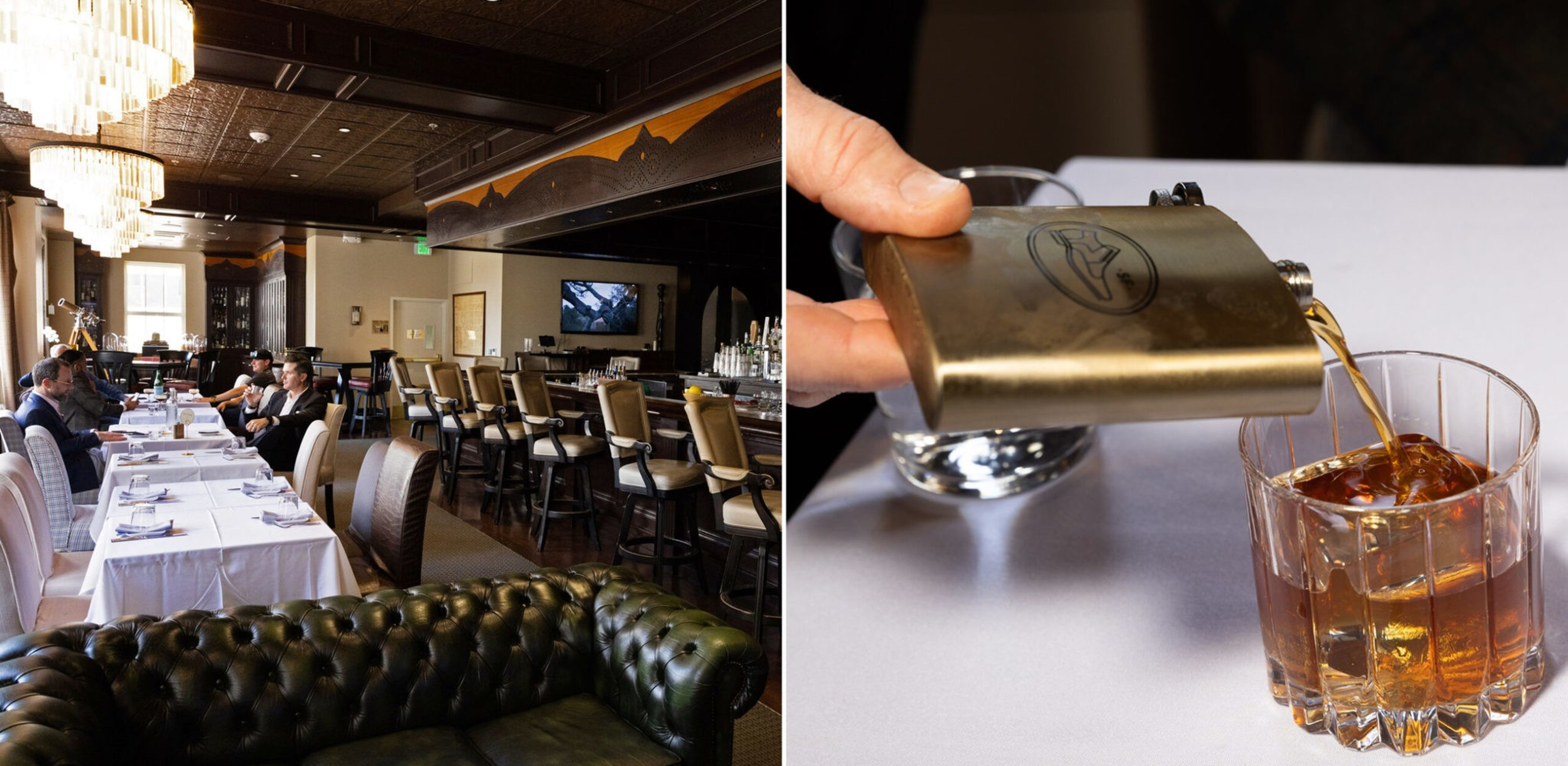At a time when leaseholders are pulling out of San Francisco buildings faster than Karl the Fog rolls into town, one could question the sanity of a massive investment in the Downtown-adjacent neighborhood of Jackson Square—a roughly six-block (opens in new tab) area north of Union Square that has Jackson Street running through its middle and the Transamerica Pyramid at its edge.
Why, then, is Michael Shvo betting $400 million on the future of the area?
Perhaps it’s because Shvo foresees a future for a thriving neighborhood built upon the kind of understated wealth that permeates the area in the form of pricey members-only clubs and high-earning employees who spend their salaries on inconspicuously bespoke garments.
Elegance, simplicity and timelessness are the hallmarks of “quiet luxury,” a fashion world term that has spilled out into popular culture—thanks in large part to the hit show Succession.
READ MORE: Westfield Gives Up Downtown San Francisco Mall
The keyword is nearing 40 billion views on TikTok (opens in new tab), and think pieces about the look are proliferating faster than scandals within the Roy family.
Quiet luxury connotes the oxymoronic idea of minimalist wealth. The idea is that you invest in a small number of high-quality pieces that are unique and have enduring appeal.

It’s the term that Catherine Conway, founder of the 11th State custom clothing company, uses to describe not only her Jackson Square business but also the neighborhood itself.
“Quiet luxury 100% describes the area,” Conway said. “You just feel it.”
Eschewing the banality of big-box department stores for customized, catered experiences might be the answer for retail and office space’s survival—and not just a solution, but the solution.
Evan Krow—CEO of Wingtip, the social club that also used to operate the ground-floor shops at the eight-floor former Bank of Italy building on 550 Montgomery St. in the Jackson Square Historic District—believes high-end, unique clothing is the sole reason customers seek out brick-and-mortar stores.
“It’s the reason why people are leaving their house,” Krow said. “Otherwise, they’ll just buy online.”
You Are What You Wear
The idea of quiet luxury—what the Jackson Square neighborhood exemplifies with its charming brick buildings and tidy storefronts—is not new.
Mark Zuckerberg and Bill Gates have worn hundred-dollar T-shirts for decades (opens in new tab), and the neutral colors and simple silhouettes of “stealth wealth (opens in new tab)” have been around for years.
Yet the idea is having a particular revival, specifically in the tech world, where engineers tend to value high craftsmanship and simplicity—and have the disposable income to pay for it.
The ultra-minimalist Common Projects sneakers on Mr Porter (opens in new tab), for example, have achieved cult status with techies, taking the place of more affordable, pedestrian footwear. The brand name doesn’t appear on the sneaker; instead, there’s a gold-stamped serial number. The cheapest pair runs $400.
Niche fashion line Isabel Marant—a French designer known for luxe, high-quality pieces—opened a 2,300-square-foot boutique in Jackson Square in 2015, what was then only the brand’s third U.S. location.

The shops at Wingtip (opens in new tab), which became a separate entity from the social club six years ago, stand across the street from the Transamerica Pyramid and embody the kind of customized and unique look that goes hand-in-hand with quiet luxury. There’s the handmade head covers of Little Prince Customs (opens in new tab) that start around $100, the high-end menswear shop B&B (opens in new tab) selling shirts in the $150-$300 range and the all-custom clothier 11th State (opens in new tab).
The setting of the Wingtip is anything but understated—the bank building opened in 1908 with Amadeo Peter Giannini at the helm, the financier who’s responsible for the predecessor to Bank of America—but its decadence makes it a destination. Positively dripping with marble and gilt, there are cabochon stones set into the walls and ornate molding. It’s a space that makes one feel elevated.
Business is uniformly good, according to the shopkeepers inside. Conway has officially turned the corner on the pandemic-caused downslope, Little Prince Customs is filling big orders thanks to Instagram fame and B&B is relying on its loyal clientele to keep sales humming.
“Millennials don’t want to shop at big-box stores,” Krow said. “They want something unique.”
The cluster of niche, high-end businesses together in one space also has the advantage of cross-pollination. Gone may be the era of the department store, but there’s something else much more special to replace it—individual lines with individual personalities that can work alongside one another, offering what customers want without a one-size-fits-all approach.
This may be the blueprint for retail’s survival, and even ongoing layoffs and bank failures could be good for the kind of shopping experience quiet luxury provides.
“When times are hard, people dress up,” Conway said. “They’ve got to show up when they go to work.”
The Connective Tissue of Social Clubs
The bespoke nature of the businesses around Jackson Square echoes the proliferation of private social clubs in the area, all of which cater to a distinctive clientele looking for unique and personalized experiences.
While Union Square retail anchors might be shuttering, the Wingtip social club (opens in new tab), which has a $250 per month membership fee, is expanding. It currently occupies the top two floors of 550 Montgomery and plans to open a members-only bar on the first floor within a year (the move will push out the existing businesses, but most hope to move to a second-floor retail space in the same building).

“It’s going to be phenomenal,” Krow said, showing off designs that include a back bar set against ornate plastered walls and modern chandeliers dropping from the ceiling. Unlike the upper level club, the ground floor will offer on-the-spot memberships for a yet-to-be-determined cost.
Across from the Wingtip Club—which will be rebranded as Club Corbeaux in the hope of bringing in more female members—the Core Club (opens in new tab) will open in three floors of the renovated Transamerica Pyramid. The exclusive club has initiation fees as high as $100,000 and an $18,000-per-year membership fee, which will be out of reach for all but the very few.
Across the street in the other direction is Chief, a women’s executive club for networking and socializing, and a few blocks toward the waterfront is the uber-posh club the Battery. Even tiny alleyway Hotaling Place has a members-only joint: an invite-required dining establishment called the Villa Taverna (opens in new tab).
Krow is not concerned about the competition—he argues all of these clubs have different appeals. And while he acknowledges a potential impact on nearby watering holes, he believes the clubs bring more people to the area to frequent them, noting that Wingtip organizes excursions to local restaurants even though it has its own on-site kitchen.

But it’s hard not to worry about what will happen to the mom and pop bars that are open to everyone and have no fee to join, especially since businesses have already been struggling so much post-pandemic.
Scott Jeffery, a spirit buyer for Maison Corbeaux, which is also owned by Krow (corbeaux is the plural for “crow” in French), pointed to changes in the neighborhood, like the whiskey joint Hard Water that closed in 2022. It makes Jeffery concerned about the future of other local bars, like Irish Times. “I walk by Irish Times looking empty, and it’s such a great bar.”
“Business has been up and down, and we haven’t had much luck this year,” said Jack O’Toole manager and partner of Irish Times. But O’Toole doesn’t blame his business’s struggles on the many social clubs in the neighborhood. “They bring in more people into the area, which is better for us,” he said, noting that a recent multiday blackout due to a PG&E transformer fire slammed the business.
The many social clubs also offer something—with a price—that more traditional places can’t always provide. They’re a way to ease the pandemic- and remote work-fueled loneliness, with a guarantee you’ll see the same set of faces and begin to develop deeper bonds and community.
“People still want to go out,” Krow said. “They just want something different.”
Devil’s Acre to Destination
Strolling by the charming brick buildings around the Jackson Square Historic District couldn’t be a more distinct experience from seeing Union Square’s big-box brands and gaping holes of empty office space. At the juncture of three historic neighborhoods—Chinatown, North Beach and the Financial District—Jackson Square also benefits from overflow charm.
Small business owners sip rosé at coral-colored sidewalk tables tucked along the sidewalk in front of the gourmet patisserie Maison Nico. Senreve offers luxury handbags for the eco-conscious on Jackson in a sizable storefront, while a two-floor luxury bridal store stands across the street.

A dinner venue featuring live entertainment that changes nightly, Lyon & Swan (opens in new tab) promises “food and debauchery” in a space once run by the famed Mona Sargeant. The sensual supper club occupies hallowed ground as the former site of a “black and tan” club named the Jupiter, owned by Jelly Roll Morton, and Mona’s, one of the first lesbian bars in the country.
Smoky aromas from Cotogna lace the air, and the Italian restaurant embodies effortful-yet-effortless fine dining: wooden, rough-hewn tables are placed on the sidewalk between potted olive trees and oatmeal-hued blankets wrapped with twine rest on stools—just in case diners get a chill. Across the street, blonde wood furniture and plate glass windows beckon from a Blue Bottle shop naked of decorations.
“If you like whisky or chocolate, you’re in the right part of town,” said a guide giving a walking tour, explaining that the famed cluster of drinking establishments was also the site of the first Ghirardelli factory.

Walking tours are another thing that have picked up since the pandemic—and not only daytime strolls, but evening Barbary Coast-themed excursions that fill the neighborhood by night with thirsty tourists. While the neighborhood might today connote luxury with its brick buildings reminiscent of Brooklyn brownstones, it used to be ground zero for the obscene.
Historically referred to as the “Devil’s Acre” for its vice-filled bars and brothels—a phrase that today lends its name to a nearby bar on Columbus Avenue—this used to be the heart of the Barbary Coast, known as the center of sin in an already salacious city.

And while the poise of today’s luxury may be the inverse of the drinking of yore, it’s also decadence by another name: soft instead of loud, understated instead of in-your-face.
But not everyone is experiencing the boon of quiet luxury in Jackson Square. Employees at the relatively empty outposts of larger brands like Allbirds and Shinola wonder if brick-and-mortar retail will ever completely return.
“To think it will is living in a dream world,” said Rodrick Alexander, who works at Shinola. He is skeptical that the renovations at the Transamerica Pyramid will contribute greatly to reviving the neighborhood and wonders if they’ll even be completed.
As if to prove his point, “Wishing on a Star” starts playing on the store’s loudspeakers. Nextdoor at Allbirds, Delbrina Mumphrey is similarly pessimistic.
“Normally, the store would be full of people at this time,” Mumphrey said, gesturing to the small number of customers in the shop on a Wednesday afternoon. “We’ve never recovered from the pandemic.”
There are also the challenges of operating any business in the city, big or small, an issue that Mayor London Breed has tried to alleviate with a recent overhaul of the planning code.
“Things are coming back,” said Megan Gorman, a small business owner in the neighborhood. “But this is not a business-friendly city.”
It’s telling that the bigger brands—despite being household names—appear to be struggling, whereas the smaller, custom lines see their businesses surging. It’s perhaps another indication that quiet luxury is here to stay.
